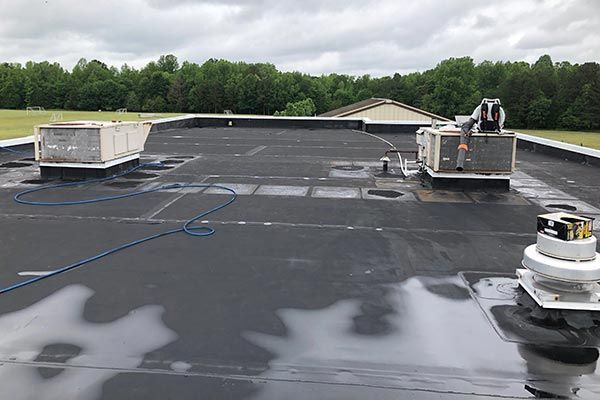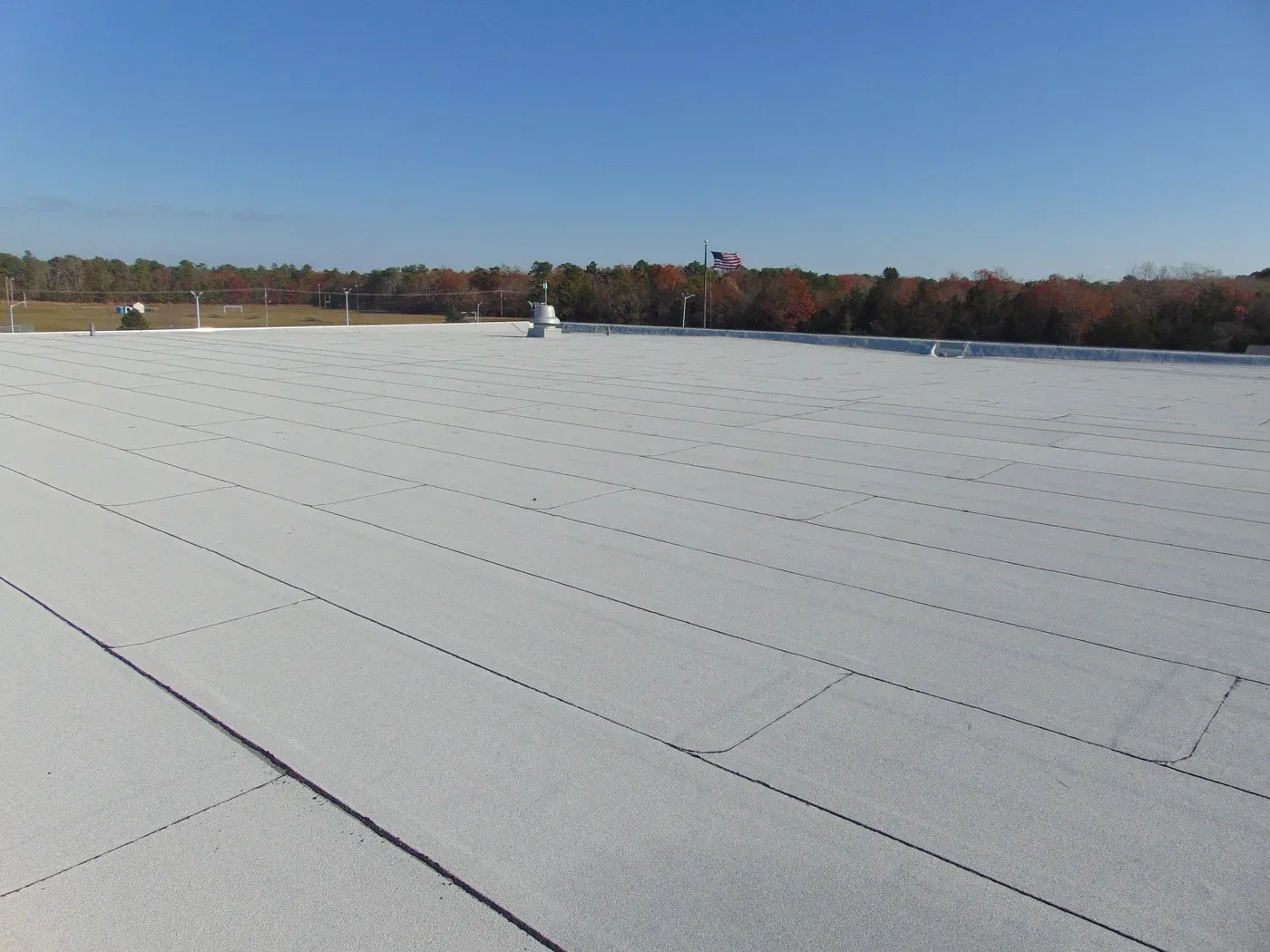At Roanoke Roofing Company, we know flat roofs inside and out. We offer top-notch flat roof services in Roanoke, VA. Our team can handle both repairs and new installations for homes and businesses.
We provide roof coating systems, repairs, and maintenance for many types of commercial roofs. This helps keep buildings dry and protected from the elements. Our expert roofers use high-quality materials to fix leaks, patch damage, and apply new coatings.
For flat roof installations, we offer several options to fit different needs and budgets. We can install traditional built-up roofing, single-ply membranes, or spray polyurethane foam systems. Our warranties cover both labor and materials for up to 20 years on some roofing systems. This gives our customers peace of mind about their investment.
COST OF ROOFING
Use our form to estimate the initial cost of our services.
Popular Flat Roofing Materials
Flat roofs need durable materials that can withstand weather and UV rays. We'll explore four common options that offer different benefits for commercial buildings in Roanoke.
EPDM Rubber Roofs
EPDM (ethylene propylene diene terpolymer) is a synthetic rubber material widely used for flat roofs. It's known for its durability and longevity.
Key features of EPDM roofs:
- Lifespan of 20-30 years
- Resistant to UV rays and ozone
- Flexible in extreme temperatures
- Low maintenance requirements
EPDM comes in black or white. White EPDM can reflect sunlight, helping to reduce cooling costs. This material is relatively easy to install and repair, making it a popular choice for commercial buildings in Roanoke.
TPO and PVC Solutions
Thermoplastic polyolefin (TPO) and polyvinyl chloride (PVC) are single-ply roofing membranes that offer excellent durability and energy efficiency.
Benefits of TPO and PVC roofs:
- Highly reflective white surface
- Energy-efficient, reducing cooling costs
- Resistant to chemicals and UV radiation
- Weldable seams for a watertight seal
These materials are lightweight yet strong. They can withstand foot traffic and punctures better than some other options. TPO and PVC are becoming increasingly popular for flat roofs due to their performance and cost-effectiveness.
Modified Bitumen Roofing
Modified bitumen is an asphalt-based roofing material reinforced with fiberglass or polyester. It's known for its toughness and flexibility.
Advantages of modified bitumen:
- Multi-layer protection
- Good resistance to foot traffic
- Can be installed in various ways (torch-applied, cold-applied, or self-adhered)
- Available in light colors for better energy efficiency
This material is particularly well-suited for buildings with a lot of rooftop equipment or frequent maintenance needs. Its multi-layer system provides excellent waterproofing and durability.
Built-Up Roofing (BUR)
Built-up roofing, also known as tar and gravel roofing, is one of the oldest flat roofing systems. It consists of alternating layers of bitumen and reinforcing fabric.
Key aspects of BUR:
- Excellent waterproofing and UV protection
- Fire-resistant properties
- Long lifespan (20-30 years with proper maintenance)
Can be topped with gravel for added protection and aesthetics
BUR is highly durable and can stand up to harsh weather conditions. It's a good choice for buildings that need a robust, long-lasting roof. However, it's heavier than some other options and may require structural reinforcement.
Understanding Flat Roof Systems
Flat roof systems are a popular choice for commercial buildings in Roanoke. They offer unique advantages and require specific maintenance considerations. Let's explore the key features and benefits of flat roofing options.
Characteristics of Flat Roofs
Flat roofs aren't completely level. They have a slight slope, usually 1/4 inch per foot, to allow water drainage. Common materials for flat roofs include:
- Built-up roofing (BUR)
- Modified bitumen
- EPDM (rubber)
- TPO (thermoplastic polyolefin)
These systems typically consist of multiple layers:
- Roof deck
- Insulation
- Waterproof membrane
- Protective top layer
Flat roofs require regular inspections and maintenance. We recommend checking for ponding water, cracks, or bubbles in the roofing material. Proper drainage is crucial to prevent water damage and extend the roof's lifespan.
Benefits of Flat Roofing
Flat roofs offer several advantages for commercial buildings in Roanoke. They're cost-effective and easier to install than sloped roofs. This can lead to significant savings on labor and materials.
Flat roofs provide extra usable space. Many businesses use their rooftops for:
- HVAC equipment placement
- Solar panel installation
- Rooftop gardens or recreational areas
We find that flat roofs are energy-efficient. They reflect more sunlight than sloped roofs, helping to keep buildings cooler in summer. This can lower air conditioning costs.
Maintenance is often simpler on flat roofs. They're easier and safer to walk on for inspections and repairs. Some flat roof materials, like TPO, are highly durable and resistant to UV radiation and chemicals.
Installation Process for Flat Roofs
Flat roof installation requires careful planning and execution. We follow a systematic approach to ensure a durable and watertight roof for our Roanoke customers.
Preparing the Substrate
We start by thoroughly cleaning the roof deck. This step is crucial for proper adhesion of roofing materials. We remove all debris, old roofing, and protruding nails.
Next, we inspect the deck for damage. Any rotted or weakened areas are replaced to create a solid foundation.
We then apply a primer to the clean, dry surface. This helps the roofing membrane stick better and last longer.
Proper slopes are essential for drainage. We create tapered areas using insulation boards to guide water toward drains or gutters.
Insulation and Ventilation Considerations
Insulation is key for energy efficiency. We use high-quality materials like polyisocyanurate or extruded polystyrene.
The thickness of insulation depends on local climate and building codes. We calculate the right R-value for each project.
Proper ventilation prevents moisture buildup. We install roof vents or edge vents as needed.
For buildings with high humidity, we may add a vapor barrier. This stops moisture from damaging the insulation and roof structure.
Waterproofing and Sealing Methods
We offer several flat roofing systems including EPDM, TPO, and modified bitumen. Each has unique installation methods.
For EPDM, we roll out the membrane and secure it with adhesive or mechanical fasteners. Seams are sealed with special tape or adhesive.
TPO installation involves heat-welding seams for a strong, watertight bond.
Modified bitumen is typically torch-applied or installed with cold adhesive.
We pay extra attention to roof penetrations like vents and chimneys. These areas get additional flashing and sealant to prevent leaks.
Maintenance and Repair Strategies
At Roanoke Roofing Company, we focus on keeping flat roofs in top shape. Our strategies help prevent issues and extend roof life. We use proven methods to spot and fix problems early.
Regular Inspection Schedule
We recommend checking flat roofs at least twice a year. Spring and fall are good times for these checks. Our team looks for cracks, blisters, and pooling water. We also check seams and flashing.
During inspections, we clean debris from drains and gutters. This prevents water buildup. We look closely at areas around vents and pipes. These spots often leak first.
Our pros use special tools to find hidden moisture. This helps catch problems before they get big. We give you a full report after each check.
Addressing Common Flat Roof Issues
Leaks are a top concern for flat roofs. We find and fix them fast. Our team uses high-tech gear to spot wet spots. We then repair the damage quickly.
Ponding water can harm flat roofs. We level low spots to fix this. Sometimes we add new drains. This helps water flow off the roof.
Blisters and cracks need quick action. We cut out bad areas and patch them. For bigger issues, we might suggest a roof coating. This seals the whole surface.
Long-Term Care Techniques
We offer plans to keep your roof strong for years. Regular cleaning is key. It stops dirt and plant growth that can harm roofs.
Coatings are great for long-term care. They add a tough layer that fights sun and rain damage. We pick the best type for your roof.
We also check and fix flashing often. Good flashing stops leaks where the roof meets walls or vents. Sometimes we suggest adding insulation. This can save energy and protect the roof.
FAQs
Flat roofs in Roanoke have specific material options and warranty considerations. We'll cover the most common roofing materials and typical warranty offerings from local companies.
What materials are most commonly used for flat roofs in Roanoke, Virginia?
In Roanoke, EPDM rubber, TPO, and modified bitumen are popular flat roofing materials. EPDM is durable and cost-effective, lasting up to 30 years with proper maintenance.
TPO offers excellent energy efficiency and UV resistance. It's a great choice for commercial buildings in Roanoke's climate.
Modified bitumen combines durability with ease of installation. It's often used on smaller flat roof areas.
What are the warranty options for flat roof repair or installation with Roanoke Roofing Companies?
Warranty options vary among Roanoke roofing contractors. Many offer 10-20 year warranties on materials and workmanship.
Some companies provide extended warranties for an additional cost. These can cover up to 30 years for high-quality installations.
It's important to read warranty terms carefully. Coverage may differ for repairs versus full installations.
We recommend asking about warranty transferability if you plan to sell your property. This can add value to your investment.


